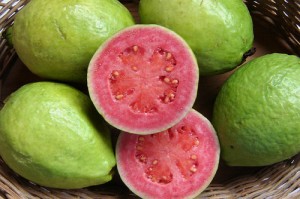Guest writer for Wake Up World
Guava is a tropical fruit grown in hot, humid and dry regions of North America and other similar climates around the world. There are several types of guava including white, red, purple, pink, and yellow. Guava fruit and its juice are sweet, and provide many health benefits: guava contains a large number of beneficial nutrients and it is considered a great source of soluble fiber.
The benefits of guava juice are important for your health: guava is extremely high in vitamin C (about 228 mg per 100 mg serving), vitamin A, and the phytochemicals, betacarotene, lutein and lycopene.
Vitamin C is extremely important as a water-soluble antioxidant which protects our cells from free radical damage. It is also very important in the formation of type-3 collagen necessary to manufacture and support blood vessels, skin, and gums. Vitamin C is also crucial in the formation of immune cells, connective tissue, and blood clotting mechanism. By eating guava or drinking its fresh juice, you will reap the many health benefits of guava juice.
[pro_ad_display_adzone id=”110028″]
What about the many other guava juice benefits? Well, it contains a healthy dose of vitamin A, which is an essential nutrient vital for vision, to strengthen your immune response, and for the maintenance of mucous membranes and skin. The phytochemicals in guava give this fruit or its juice a super antioxidant “punch.” These important chemicals are necessary in the prevention of cataracts caused from excessive UV damage and also for protecting the lungs from the damaging effects of pollution and toxic smoke.
Plus, have you been told to eat more tomatoes to get a good amount of lycopene? Pink guava actually has approximately twice as much lycopene as a tomato! Lycopene has been found to inhibit prostate cancer cell growth and protect the skin from the damaging free radicals caused from pollution and UV rays—another one of the great benefits of guava juice.
In addition, guava is a rich source of potassium – key for heart health and blood pressure control. This tropical wonder also contains B-vitamins, magnesium, and vitamins E and K. Now there’s even more reason to add guava juice to your daily routine, considering you’ll be reaping so many guava juice benefits.
Now although guava is mostly composed of carbohydrates (75% of the calories), because of the degree of fiber and water guava contains, the glycemic load is actually quite low (seven). The glycemic load refers to the concentration of sugar delivered per 100 gram serving. This means that guava will not disturb your blood sugar and will not result in weight gain if consumed as a whole fruit or whole fresh juice—another one of the important benefits of guava juice.
Don’t miss out on guava juice benefits. Guava can be consumed as a freshly prepared juice, eaten whole in a fruit salad, as a fruit base in the manufacture of gelato or ice cream, and in jams, jellies, or preserves.
For an excellent and refreshing drink, (and not to mention healthy, considering the numerous benefits of guava juice) add eight ounces of fresh guava juice in a mixer with one medium banana, 1/2 cup of coconut milk, and two cups of ice. Blend together and serve. Delicious!
I recommend introducing fresh guava juice into your diet to reap the benefits of guava!
Sources:
- “Guavas, common, raw” – Nutrition Data web site; http://nutritiondata.self.com/facts/fruits-and-fruit-juices/1927/2, last accessed October 28, 2013.
- “Guava nutrition facts” – Nutrition and you web site; http://www.nutrition-and-you.com/guava.html, last accessed October 28, 2013.
Previous article by Dr. McLaughlin:
About the author:
Dr. K.J. McLaughlin has degrees in nutrition, physical education, and is a certified strength and conditioning specialist with an interest in anti-aging medicine. He’s also a chiropractor with 27 years of clinical experience. He has a diverse professional background in clinical management, teaching, health promotion, and health coaching, and brings a unique passion to his work. He has also spent time studying health promotion and the effect that health education has on health outcomes.
Dr. McLaughlin lives and practices the principles of fitness, wellness, and nutrition. He goes to the gym regularly and consumes a healthy diet.
This article courtesy of www.foods4betterhealth.com
[pro_ad_display_adzone id=”110027″]







